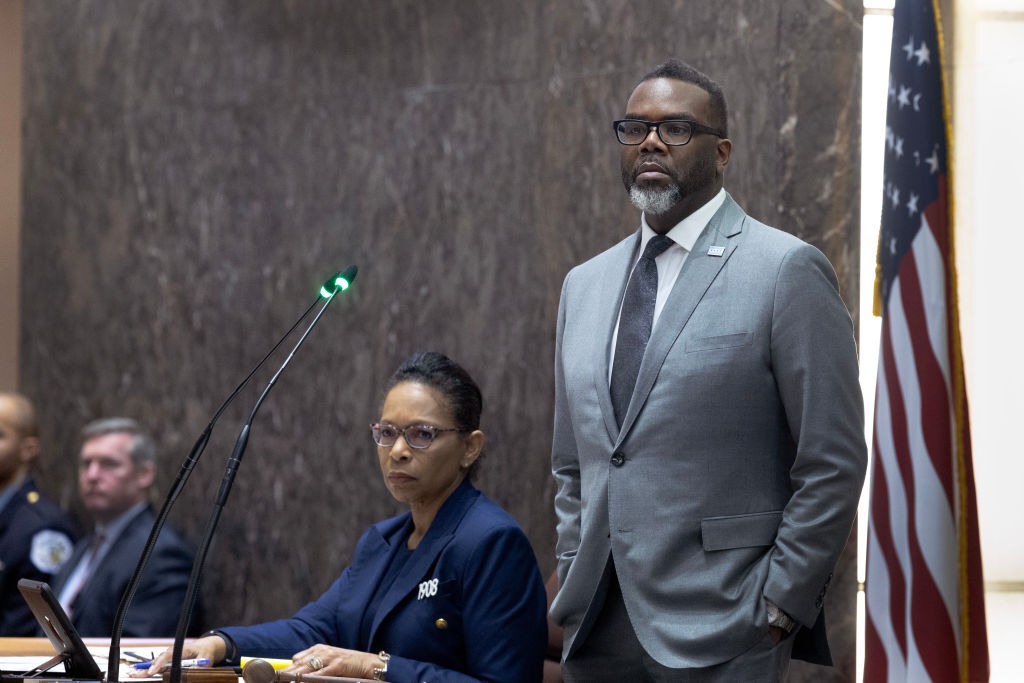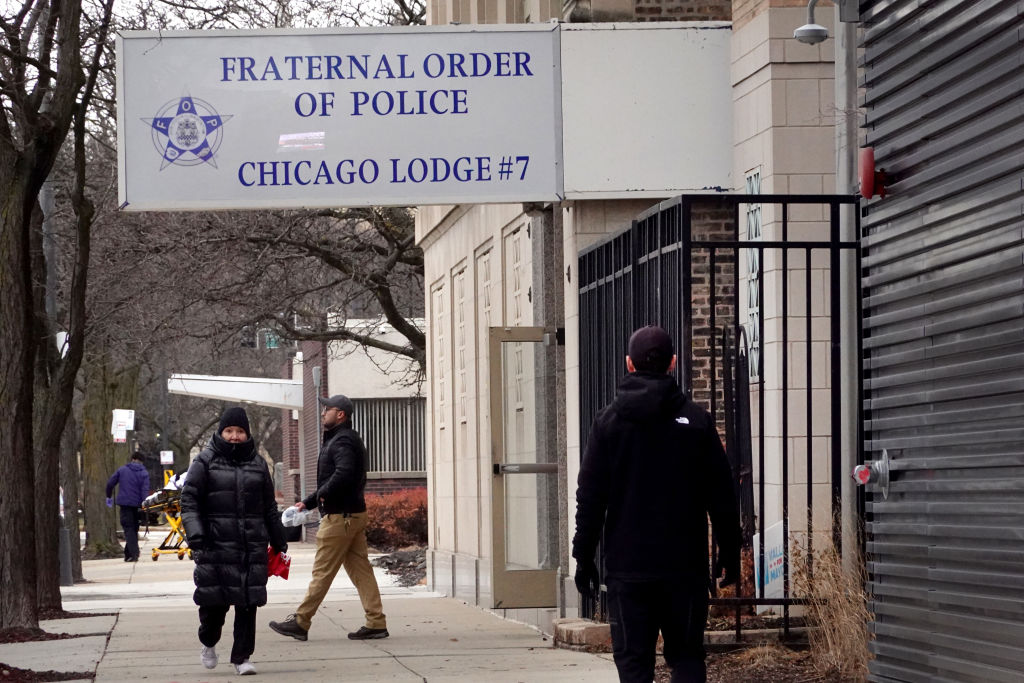100 days ago this Wednesday, Brandon Johnson was sworn in as mayor of Chicago.
During the campaign, Johnson, along with all other candidates except incumbent mayor Lori Lightfoot, responded to a Better Government Association questionnaire focused on transparency, accountability and ethics in government.
Below are Johnson’s responses from the campaign trail, with the BGA policy team’s evaluation of the mayor’s progress on the issues in his first 100 days:
Q1. Do you agree that FOIA violations are a threat to democracy and to the proper functioning of City government?
Johnson Answered:
“Yes. Open access to information and open government are essential to our democracy. The role of the press, in particular, is “to serve the governed, not the governors,” and FOIA requests by media outlets are key to providing access to information for the general public. Many requests, however, are made by non-journalists, which makes engaging in the process an act of engaging in democracy. FOIA violations threaten democracy and erode trust between government and individuals who have elected “governors” to serve. And as we have seen in Chicago, with more than 100 lawsuits filed against the Lightfoot administration, the pursuit of information becomes more of a story than the information itself.”
100 Day Evaluation: Previous mayor Lori Lightfoot’s administration was famously combative of FOIA requests, facing multiple challenges in court – as Johnson alluded to in his response – and paying out more than $1 million in settlements, judgments, and fees for FOIA-related cases.
It’s early days yet to see how much the city’s responsiveness to FOIA requests will change under the Johnson administration, but one promising sign for the first hundred days: the state’s Public Access Counselor has not yet issued any binding opinions against the city related to FOIA denials from the Johnson administration. (One binding opinion, issued May 26, related to an improper denial dating back to the Lightfoot administration.)
Q2. Will you commit to the timely release of all Inspector General reports and limit redactions only to information that would compromise third-party privacy or undermine an ongoing investigation?
Johnson Answered:
“Yes. I would absolutely commit to the timely release of Inspector General reports, and limit redactions only to sensitive and/or compromising information. Why dither, or delay? Not only is access to information important, but so is expedient access to that information. Urgency is evidence that these investigations and the subsequent reports are priorities to an administration, and as such, prioritized for the people of the city of Chicago”
100 Day Evaluation: No legislation has been introduced to give the Inspector General independent release authority. The Johnson administration has not released any of a number of significant incident reports from prior administrations that are eligible for release under the current municipal code, such as the reports on the Hilco smokestack demolition or the botched raid on Anjanette Young. Johnson’s corporation counsel has the authority to release those reports at the administration’s discretion.
Q3. Will you commit to implementing recommendations of oversight agencies, such as COPA and Inspectors General of the city and its sister agencies, and to providing a detailed explanation in any case where you opt not to implement a recommendation?
Johnson Answered:
“Yes. There must be trust in decisions and recommendations made by agencies that oversee city services. To outright reject recommendations from entities such as COPA and Inspectors General runs counter to the need for checks and balances in our government. To have oversight that mayoral administrations are constantly at odds with erodes credibility and contributes to mistrust from the general public. Let oversight perform the task it is entrusted to perform, and in instances where recommendations are rejected, city leaders must provide the proper analysis to justify that decision in a pragmatic and transparent way.”
100 Day Evaluation: The Office of the Inspector General has issued a number of reports with formal recommendations since Johnson’s inauguration. Out of 28 specific recommendations, the subject departments agreed with 24, either implementing the OIG’s recommendations or providing a timeline for implementation. The Johnson administration has an opportunity to follow through on his commitment to implementing inspector general recommendations by ordering departmental compliance with the outstanding recommendations:
- In response to the OIG’s report on investigations of officer-involved fatal motor vehicle accidents, both CPD and COPA declined to work with the city council’s Committee on Public Safety to amend the relevant language of the municipal code.
- CPD declined to commit to consistently firing officers found to have made false statements (“Rule 14” violations), citing contractual and due process protections.
- CPD declined to enact policies allowing for trackable, verified, anonymous misconduct complaints from officers reporting wrongdoing, citing a need to evaluate “practical considerations” and providing no timeline for doing so.
Q4. Do you commit to disclosing and abiding by an open and uniform appointment process for filling aldermanic vacancies?
Johnson Answered:
“Yes. I fully support any process that brings consistency, clarity and transparency to the process for filling vacancies on the Chicago City Council. Democracy must be for all, but it must start with the people entrusted with governing our city.”
100 Day Evaluation: Too early to tell. No vacancies have needed filling since Johnson’s inauguration. The administration could lay out a uniform process via executive order, if Johnson wished.
Q5. Will you commit to releasing a full dataset including appropriations, revenues, and positions as part of your mayoral budget proposals? (Currently, positions are stored in a separate dataset that is not linked to the appropriations data, and revenues are not included in either dataset.)
Johnson Answered:
“Yes. Mayors have used the City of Chicago budget to hide, obfuscate and misrepresent actual City spending and commitments for years. The City budget – and the budget presentation – is convoluted by design. Leadership means telling people the truth. The truth starts with greater budget transparency, especially in the release of information to the press and the public.”
100 Day Evaluation: Too soon to tell — but the public will get to see soon how Johnson follows through on this one. According to the mayor’s timeline, the budget will be presented at Johnson’s budget address on Oct. 11. In previous years datasets of the proposed appropriations and positions have been released at the same time as the mayoral address, but no revenue dataset is provided and the datasets are not linked. It would be a significant change in data availability – and a followthrough on this commitment – if the mayor’s Office of Budget and Management provided revenue data and linked or combined datasets this year, or released the data prior to the mayor’s address.
Q6. Direct introductions of proposed ordinances are often made in committees with no public posting of the text. Do you commit to making all direct introductions of legislation publicly available at least 48 hours in advance of the meeting?
Johnson Answered:
“Yes. City Council committees should not be a black hole of backroom dealing and rubber stamps. Legislation introduced in Council impacts the lives of residents throughout the city of Chicago. The public has every right to have access to legislation prior to committee meetings, to allow time for residents to engage with their alderpersons about the scope of proposed ordinances.”
100 Day Evaluation: Despite this promise, the Johnson administration has made multiple direct introductions into committee, with votes taken on items that had not yet been posted publicly. Additionally, a proposed change to City Council’s rules that would have required 48 hour advance notice for direct introductions was struck, and the version of the new council rules that passed still allows for direct introductions with no advance warning or public posting of the introduced material.
Q7. Will you require heads of “sister agencies” – the CTA, CPS, Park District, etc. – to appear before City Council committees when requested?
Johnson Answered:
“Yes. My administration will require leadership of the CPD, CTA, CPS, Chicago Park District and other agencies to appear before Chicago City Council committees when requested, and especially during periods of crisis and/or concern. Prior to these requests, however, my administration will encourage committee chairs to actually hold regular meetings with their colleagues, and perform the duties for which they are entrusted and appointed. An active City Council is how we truly make Chicago work for its people.”
100 Day Evaluation: Too early to tell. City Council has not formally requested a sister agency head to appear before them since inauguration.
Q8. In your administration, how will appointments to City Council committees and leadership positions be made?
Johnson Answered:
“I believe the Chicago City Council must function as a robust and democratic body that legislates in the best interests of residents of the city of Chicago. To that end, I will reset the relationship between the Council and the mayor’s office, regain their collective trust, and work collaboratively and respectfully with alderpersons to determine committee leadership positions and composition.”
100 Day Evaluation: A City Council bid for independence before inauguration ultimately failed — the slate of committee chairs named during the runoff was replaced by a new set of names after Johnson’s election. However, the new appointments took longer to be formalized than in previous administrations, and the slate of names included both Johnson supporters and alderpersons who endorsed his opponent in the election, suggesting a greater degree of negotiation and give-and-take with the council than under previous mayors.







